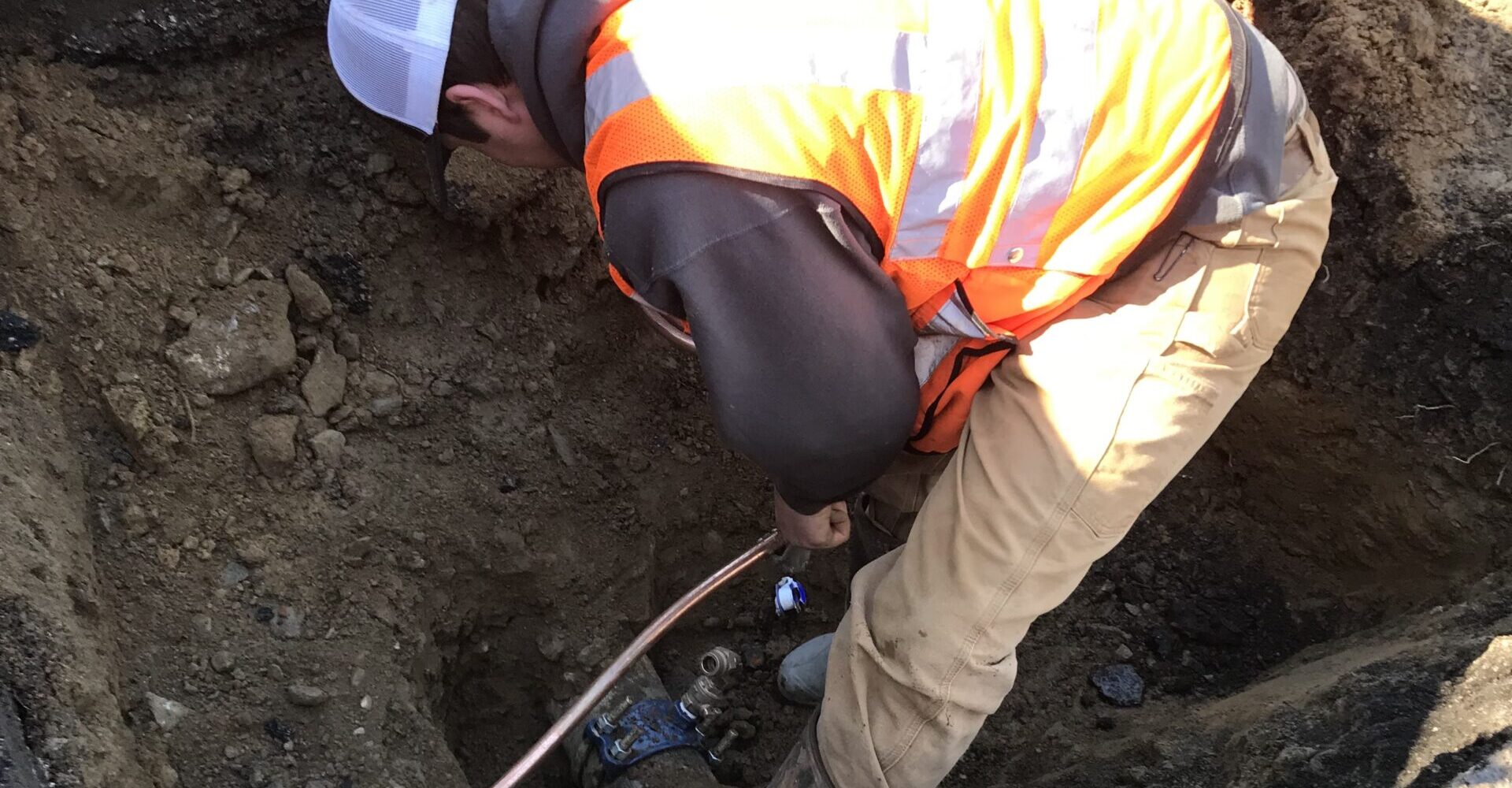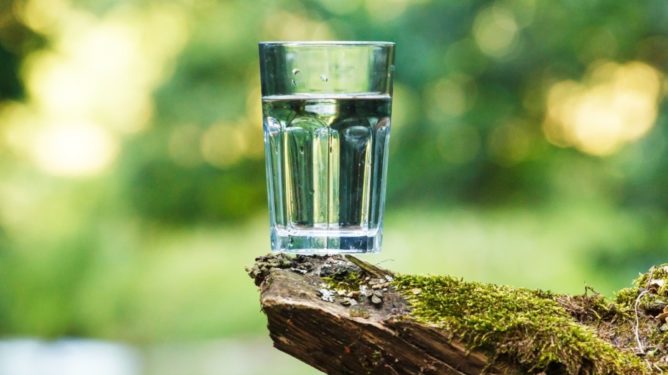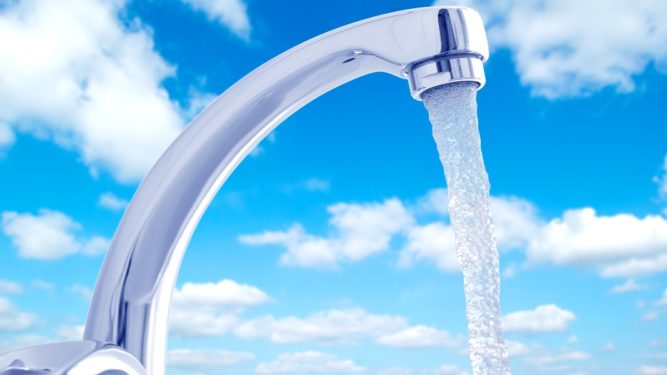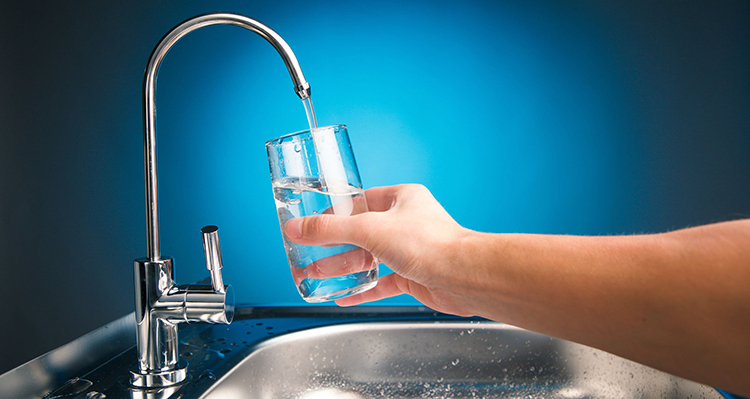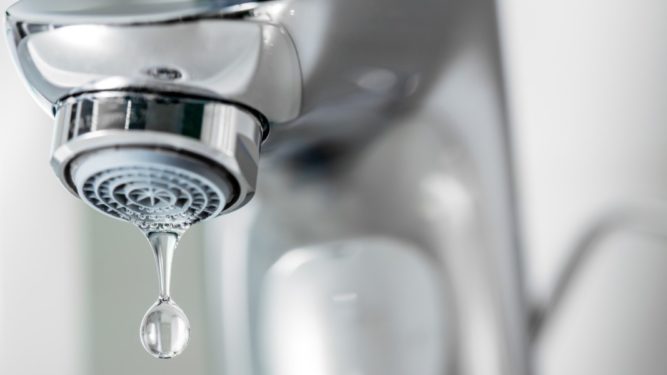Happening Now
Residents, particularly those in homes built before 1988, are strongly encouraged to participate in Asheville’s free lead and copper testing program.
To request a testing kit, or for more information on protecting against lead exposure, contact Water Resources at 828-259-5962 or email leadprevention@ashevillenc.gov.
Inventory of water utilities
The Environmental Protection Agency now requires all drinking water utilities to have a service line inventory of both the customer and utility side of the water meter. The customer side of the service line is the water line that connects your home from the water meter to the home/business on the customer’s property. The utility side of the service line connects the water main in the street to the water meter. The City of Asheville is conducting a survey of all customer homes/businesses to meet this requirement.
Please see the diagram below to understand what a service line is. We are asking for your help to determine the material on the privately-owned (customer) side of the service line.

What can you do?
Visit the Drinking Water Service Line Inventory Dashboard
Click this link to see the status of your service line material in the City’s inventory. Currently, we have many unknown materials on the customer-owned side. We urge customers to participate in the survey to help us build a better and more accurate inventory. Please check out the survey below to let us know your service line material, if you have replaced your service line, or to schedule an appointment for city water department staff to visit your home or business. You can also email us at leadprevention@ashevillenc.gov or call 828-259-5962 if you have any questions.
Participate in the Service Line Survey
The City of Asheville Water Department’s goal is to have a complete and accurate water service line inventory as soon as possible. We cannot do this without customer participation.
Customers can use the survey to do the following:
- Option 1 – If you already know your service line material, you can fill out the survey. A picture is needed. If you are unable to upload a picture, customers can still fill out the survey and request an appointment for city staff to visit the home to take a picture. Link to Survey
- Option 2 – Water Resources has produced a video on how to determine the service line material and then fill out the survey. Link to Video Link to Survey
- Option 3 – Request an appointment for water staff to visit your home or business. It only takes 10-15 minutes and access is needed to the basement or crawl space. Link to Survey
- Option 4 – If customers have replaced their service line, please fill out the survey, a picture of the service line as it enters the home or a copy of the invoice can be uploaded. Link to Survey
These options also provide customers the option to request a free lead test kit.
Lead Health Effects
Exposure to lead in drinking water can cause serious health effects in all age groups. Infants and children can have decreases in IQ and attention span. Lead exposure can lead to new learning and behavior problems or exacerbate existing learning and behavior problems. The children of women who are exposed to lead before and during pregnancy can have increased risk of these adverse health effects. Adults can have increased risks of heart disease, high blood pressure, kidney or nervous system problems.
The City Strives to Ensure Safe Clean Water
The City of Asheville’s water has consistently been verified as safe and clean, and these new regulations should not be cause for concern among our community. Customers may be impacted by construction, water quality sampling, and/or remediation practices, throughout the implementation of the revision. The City of Asheville is dedicated to providing proactive communication and transparency throughout the inventory and survey process.
Background
The City of Asheville has monitored its system for lead and copper by random sampling since 1997 and has never found a significant issue. As a best practice, Asheville Water Resources treats its drinking water by adjusting the pH to a neutral level and adding other chemicals to create a barrier between the pipe and the water. This treatment process reduces the corrosion in water lines and household plumbing. The City of Asheville’s water has consistently exceeded EPA water quality standards as reported in this Asheville Water Quality Report.
In 1991, the EPA published a regulation to control lead and copper in drinking water. This regulation is known as the Lead and Copper Rule (also referred to as LCR). Although LCR has resulted in reductions in lead in drinking water, the EPA recently approved comprehensive revisions to the rule to strengthen its public health protections and clarify its implementation requirements. Since early 2019, the City of Asheville has been anticipating these changes and developing a strategy to implement new regulations.
In January 2022 the Lead and Copper Rule Revisions (LCRR) was passed requiring all drinking water utilities to build a service line inventory. Water utilities are required to turn the inventory into state regulators by October 16, 2024. The inventory must be made available to all customers via website. Letters must also be sent to any water customer who has a service line categorized as lead, galvanized requiring replacement, or unknown within 30 days of turning in the inventory to the state.
In response to the LCRR, the EPA has proposed the Lead and Copper Rule Improvements (LCRI). It is hoped to be passed sometime in 2024. The improvements will lower the lead action level from 15 parts per billion (ppb) to 10 ppb. There are many other requirements that water utilities will have to follow to help reduce lead from drinking water. For more information about the proposed rule see this link. EPA’s Proposed Lead & Copper Rule Improvements
Service Line Inventory Preparation
October 2020 – Present – Work crews are documenting the service line materials on both the customer and utility sides of the meter during routine repairs and neighborhood enhancement projects to prepare for the new Service Line Inventory required for the Lead & Copper Rule Revisions (LCRR). We need customer participation for homes built before 1988 to reduce the number of unknowns in the inventory. Please participate by filling out the survey, calling 828-259-5962 or emailing leadprevention@ashevillenc.gov to participate. Water staff need only 10 minutes to enter the home to view where the service line enters the home.
Fall 2021 – Contract crews dug small holes at the water meter at 100 customer homes to determine service line materials. Homes were picked based on a statistical list to determine where lead service line material could potentially be. This database criteria is age of home, results of known service line material, and other factors. Out of the 100 homes surveyed, no lead service line material was found but galvanized requiring replacement was found at 25% of the homes on both the private and public owned sides.
Winter 2022 – An interactive dashboard was made available for customers to look up their address to check the service line material on the private or utility side of the meter. If the status is unknown, we ask that customers fill out the survey, call 828-259-5962 or email leadprevention@ashevillenc.gov to learn how they can participate.
Supporting Documents
Infographic – Improving Lead Sampling to Better Protect Public Health
EPA Final Revisions to the Lead and Copper Rule
2016 article- Keeping Asheville’s water supply safe: Testing, constant monitoring are key
Contact Information
Brenna Cook – Compliance Manager
828-259-5962
LeadPrevention@ashevillenc.gov
